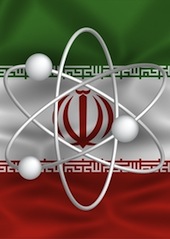Time to Let Iran Prove Itself
With a short-term deal struck, Iran must be given the chance to be tested.
December 4, 2013

The P5+1 finally reached an interim deal on November 24 to curb the Iranian nuclear program in exchange for initial sanctions relief. This agreement may pave the way for a rapprochement of historic proportions.
However, it was also met with sharp criticism from Israel, as well as some members of the U.S. Congress. Nevertheless, the breakthrough will give Iran, and President Rohani’s new administration, the chance to be tested.
There is good reason to believe that Tehran is serious about finding a long-term solution to the decades-long impasse. This is because it is apparent that Iran’s current push to find a diplomatic solution to the issue is driven more by self-interest than anything else. In foreign policy, there is no motivation that is more honest than that.
A heavy toll
The latest round of sanctions have taken a heavy toll on the Iranian economy. The country’s oil exports have dropped by 70% in the past year, with Iraq now overtaking Iran to become OPEC’s second-biggest oil producer.
The loss of oil rents, which constitute nearly half of government revenues, coupled with the freezing of international assets as well as the cut-off from the international banking system have drastically reduced Iran’s reserves of foreign exchange and pushed the inflation rate to 40%.
While many government-controlled sectors are undoubtedly feeling the sting of the sanctions, average Iranian citizens are being affected even more drastically. The price of food and consumer products has risen dramatically. The unemployment rate, which stands at nearly 30%, is higher than that of recession-plagued Greece.
The United States can be proud: Never in the history of foreign policy has there been a sanctions regime that was more effective.
Charm offensive
Against this backdrop, Iran both wants and needs to put an end to the sanctions. This is why we can deem the recent charm offensive of President Rohani in Washington and Iran’s initial concessions in Geneva to be sincere.
What is needed now is constructive cooperation from all sides. It is not about naïve appeasement but, instead, about a policy that provides President Rohani – who has to contend with powerful conservative rivals at home – a real opportunity to demonstrate success. One has to allow him to extricate the country from the corner that his predecessor pushed it into.
During a recent energy conference on Iran’s Kish Island in the Persian Gulf, one could sense the yearning of representatives from various business sectors for a compromise.
The new Petroleum Minister Bijan Zanganeh, who is considered a respectable energy expert in the West, the self-critical and objective Economics and Finance Minister Ali Tayebnia, as well as leading executives from energy, mining and manufacturing companies all had one key message: Iran must reintegrate itself into the world economy and get its exports rolling again.
Popular pressure
To what extent these assembled individuals can actually convince the religious leaders of the country, and above all Supreme Leader Khamenei, is difficult to ascertain.
However, there is much to suggest that the pressure on the broader populace and the economy of the country is so great, that it will be difficult even for the spiritual leader of the country to dismiss calls for reaching a permanent deal.
A long-term solution to the issue is in the interest of all parties. Iran could finally exploit the full potential of its vast natural resources. It has the world’s fourth-largest oil and the second largest gas reserves. However, its oil and gas infrastructures are outdated and inefficient.
Iran flares more gas annually than the entire yearly output of Azerbaijan. The country did have various plans to develop and modernize its energy sector. These included exploring new fields and developing current ones, boosting the oil recovery factor as well as completing additional phases of the giant South Pars gas field in the Persian Gulf.
Production-sharing agreements
However, none of these plans came to fruition due to the absence of international energy companies and technological capacity. Iran needs to rebuild trust and pursue new forms of cooperation and partnership in order to draw foreign investors back in.
This could, for instance, be achieved by offering production-sharing agreements (PSAs) instead of the less-favorable Iranian buyback contracts to energy companies looking to invest in the country. This is what Iraqi-Kurdistan has successfully been doing for the past few years.
However, there is strong resistance against the presence of foreign companies, and particularly foreign energy companies, within Iran. Here, international oil and gas companies must also do their part to restore trust. They have to come as partners and not as exploiters.
The IEA projects that global energy demand will grow by more than one-third over the period to 2035. What is more, Iran’s heavy dependence on oil and natural gas, which constitutes 98% of the country’s total energy consumption, has left the vast potential and benefits of renewable energy virtually untapped.
First steps
One of the first steps that can be taken in the energy sector, should sanctions be lifted, could be a big energy efficiency and renewables initiative between Iranian and international companies.
The political gains for all parties involved could be even greater than the mutual economic benefits of a potential reintegration of Iran into the world economy. A nuclear deal with Iran could eventually pave the way for political reconciliation, similar to the Gas-for-Pipes deal between Germany and Russia during the peak of the Cold War.
The international community understands Israel’s reservations regarding a deal with Iran, especially in light of threats made against it by President Rohani’s predecessor. It is Prime Minister Netanyahu’s duty to make sure that Iran’s intentions are genuine.
However, for Israel, a permanent agreement between Washington and Tehran would ultimately mean more long-term security than the present situation of threats and fears.
Editor’s note: A version of this essay originally appeared at Energy Post.
Takeaways
Iran's unemployment rate, at nearly 30%, is higher than that of recession-plagued Greece.
The US can be proud: Never before has there been a sanctions regime that was more effective than those against Iran.
What is needed now on Iran is constructive cooperation from all sides.
It is not naive appeasement to give Rohani a chance to extricate Iran from his predecessor's corner.
The pressure on Iran's populace is so great that it will be hard even for Khamenei to dismiss calls for a final deal.
Iran needs to rebuild trust and pursue new forms of cooperation to draw foreign investors back in.
International oil and gas firms have to come to Iran as partners and not as exploiters.
Oil and gas constitutes 98% of Iran's total energy consumption. International firms could help with renewables.

